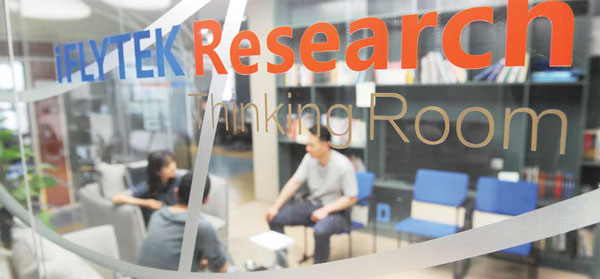The can-do generation to the fore
Updated: 2016-06-10 08:32
By Gao Yuan(China Daily Europe)
|
|||||||||
|
Employees talk at the thinking room of Iflytek Co, a technology startup dedicated to the research of intelligent speech and language technologies in Hefei, Anhui province. [Photo provided to China Daily] |
Now, nearly four decades after China began opening up, there is a new boom in startups, but rather than selling fabrics, cheap plastic toys, cakes and the like, these ventures have a sharp technology bent and are looking to serve markets the size of which their earlier counterparts could barely have conceived of.
In these fledgling companies the country sees the opportunity to give a fillip to innovation, in turn spurring domestic consumption that can help ensure the country's future prosperity.
Two years ago Premier Li Keqiang sounded a clarion call to the young to start their own businesses and take up the challenge of technological innovation, and he pledged the government's wholehearted backing.
Following up on that, last year the government unveiled dozens of measures aimed at helping grassroots entrepreneurs, including giving them tax breaks and easing their path to obtain finance.
Lin Nianxiu, deputy director of the National Development and Reform Commission, says the aim is to cut red tape and help the startups solve practical problems.
China also announced an Internet Plus strategy, an initiative that promotes the adoption of advanced information technology in traditional sectors in an effort to stimulate the economy.
In the first quarter of this year industrial output in the high-tech sector rose 9.2 percent, compared with a rise of 5.8 percent in industrial output overall, the National Bureau of Statistics said. Revenue in the software industry grew 15.5 percent.
The Ministry of Industry and Information Technology says plans are afoot to make it easier for internet startups to enter sectors such as manufacturing, services and logistics to increase efficiency and product quality.
To promote the growth of technology startups, industry regulators say, faster and cheaper internet service will be provided. The central government is also considering a negative list mechanism to make it easier for startups to do business with state-owned enterprises.
A negative list would spell out a small number of businesses or services that are closed to internet firms, and the businesses that are not listed would provide a happy hunting ground.
A plethora of antiquated industry regulations still prevent startups from providing IT services for government-backed projects and state-owned enterprises. There has also been a lack of incentives to startups hungry for liquidity to borrow money from banks at special rates.
Venture capitalists have been a major financial source for Chinese startups. Preqin Ltd, a research firm in London, says venture capital firms invested in 1,555 deals in China last year, spending $37 billion (33 billion euros), more than double the sum of the previous year.
Liu Dong, managing director of Accenture Technology Labs in Beijing, says technology innovation is playing an increasingly critical role in China as the country looks for ways to produce products with larger added value.
"The tech-savvy young generations are becoming a driving force for growth, paving the way for wider use of information technologies in the country," Liu says.
Those young brains are working night and day building up their own businesses. One who has gone down that path is Zhao Yong, a former engineer with Google Inc. He obtained a doctorate in computer vision from Brown University in Providence, Rhode Island, returned to China in 2013 and founded the company DeepGlint. The company, in the northwestern suburbs of Beijing, develops technologies that allow computers to understand three-dimensional images they see and respond to constantly changing visual content.
Zhao had been part of a team of seven in the United States that developed Google Glass, a wearable computer device in the shape of spectacles.
DeepGlint specializes in providing computer vision technology to industries such as those in the security, auto-driving and robotics fields.
Returning to China, Zhao says, has given him a bigger opportunity to work with the Chinese market, which overseas technology firms may find harder to penetrate because of a lack of understanding of local customers.
"China needs to give more power to startups to innovate. We now have a lot more talent to work with than we did decades ago."
gaoyuan@chinadaily.com.cn
Today's Top News
Euro 2016 violence spreads to second French city
Former Italian Berlusconi to undergo surgery
The can-do generation to the fore
Riding the wave
China lists first sovereign offshore RMB bond on LSE
British PM denounces Brexit's 'complete untruths'
47% of European businesses would expand in China
Xi urges Washington to boost trust
Hot Topics
Lunar probe , China growth forecasts, Emission rules get tougher, China seen through 'colored lens', International board,
Editor's Picks

|

|

|

|

|

|








